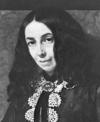- Browning, Elizabeth Barrett
-
died June 29, 1861, FlorenceBritish poet.Though she was an invalid who was afraid to meet strangers, her poetry became well known in literary circles with the publication of volumes of verse in 1838 and 1844. She met Robert Browning in 1845 and, after a courtship kept secret from her despotic father, they married and settled in Florence. Her reputation rests chiefly on the love poems written during their courtship, Sonnets from the Portuguese (1850). Her most ambitious work, the blank-verse novel Aurora Leigh (1857), was a huge popular success.
 Elizabeth Barrett Browning, detail of an oil painting by Michele Gordigiani, 1858; in the National ...Courtesy of The National Portrait Gallery, London
Elizabeth Barrett Browning, detail of an oil painting by Michele Gordigiani, 1858; in the National ...Courtesy of The National Portrait Gallery, London* * *
▪ British poetnée Barrettborn March 6, 1806, near Durham, Durham, Englanddied June 29, 1861, Florence, ItalyEnglish poet whose reputation rests chiefly upon her love poems, Sonnets from the Portuguese and Aurora Leigh, now considered an early feminist text. Her husband was Robert Browning (Browning, Robert).Elizabeth was the eldest child of Edward Barrett Moulton (later Edward Moulton Barrett). Most of her girlhood was spent at a country house within sight of the Malvern Hills, in Worcestershire, where she was extraordinarily happy. At the age of 15, however, she fell seriously ill, probably as the result of a spinal injury, and her health was permanently affected. In 1832 the family moved to Sidmouth, Devon, and in 1836 they moved to London, where, in 1838, they took up residence at 50 Wimpole Street.In London she contributed to several periodicals, and her first collection, The Seraphim and Other Poems, appeared in 1838. For reasons of health, she spent the next three years in Torquay, Devon, but after the death by drowning of her brother, Edward, she developed an almost morbid terror of meeting anyone apart from a small circle of intimates.Her name, however, was well known in literary circles, and in 1844 her second volume of poetry, Poems, by E. Barrett Barrett, was enthusiastically received. In January 1845 she received from the poet Robert Browning (Browning, Robert) a telegram: “I love your verses with all my heart, dear Miss Barrett. I do, as I say, love these books with all my heart—and I love you too.” In early summer the two met. Their courtship (whose daily progress is recorded in their letters) was kept a close secret from Elizabeth's despotic father, of whom she stood in some fear. Sonnets from the Portuguese (1850) records her reluctance to marry, but their wedding had taken place on September 12, 1846. Her father knew nothing of it, and Elizabeth continued to live at home for a week.The Brownings then left for Pisa. (When Barrett died in 1856, Elizabeth was still unforgiven.) While in Pisa she wrote The Runaway Slave at Pilgrim's Point (Boston, 1848; London, 1849), a protest against slavery in the United States. The couple then settled in Florence, where their only child, Robert Wiedemann Barrett, was born in 1849. In 1851 and in 1855 the couple visited London; during the second visit, Elizabeth completed her most ambitious work, Aurora Leigh (1857), a long blank-verse poem telling the complicated and melodramatic love story of a young girl and a misguided philanthropist. This work did not impress most critics, though it was a huge popular success.During the last years of her life, Mrs. Browning developed an interest in spiritualism and the occult, but her energy and attention were chiefly taken up by an obsession, to a degree that alarmed her closest friends, with Italian politics. Casa Guidi Windows (1851) had been a deliberate attempt to win sympathy for the Florentines, and she continued to believe in the integrity of Napoleon III. In Poems Before Congress (1860), the poem "A Curse for a Nation" was mistaken for a denunciation of England, whereas it was aimed at U.S. slavery.In the summer of 1861 Mrs. Browning suffered a severe chill and died.* * *
Universalium. 2010.
